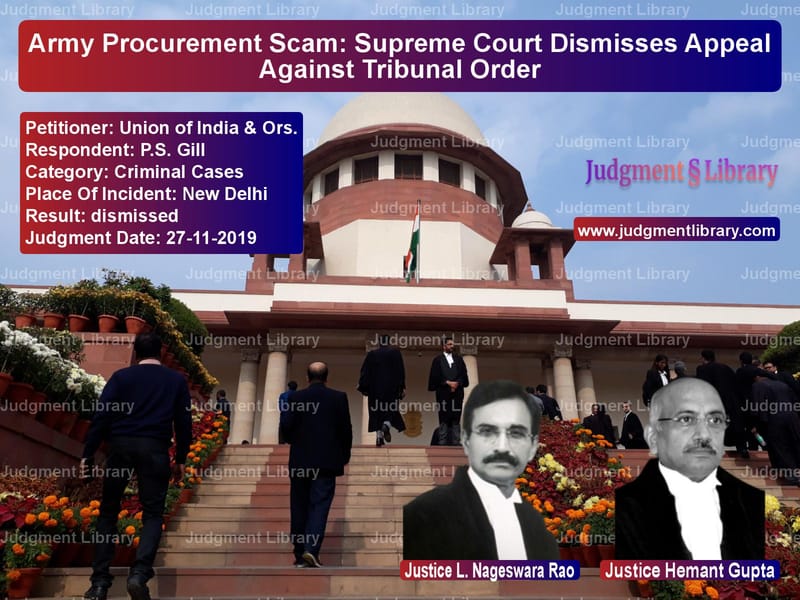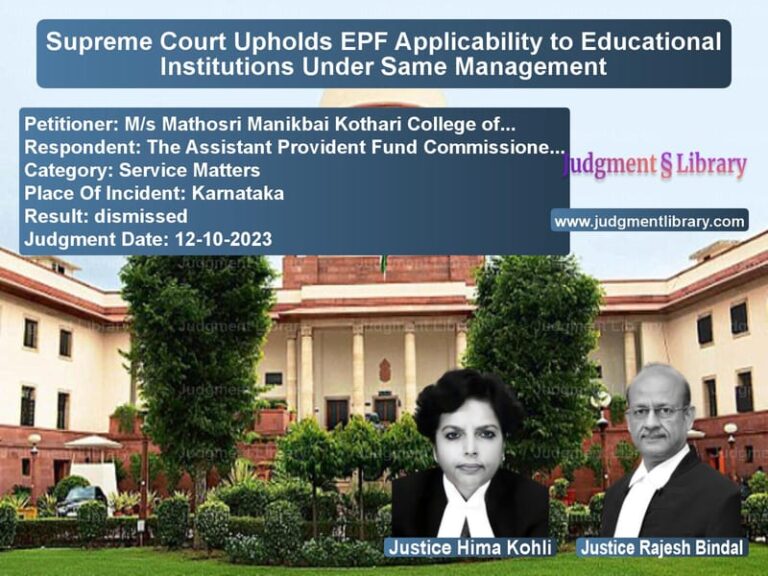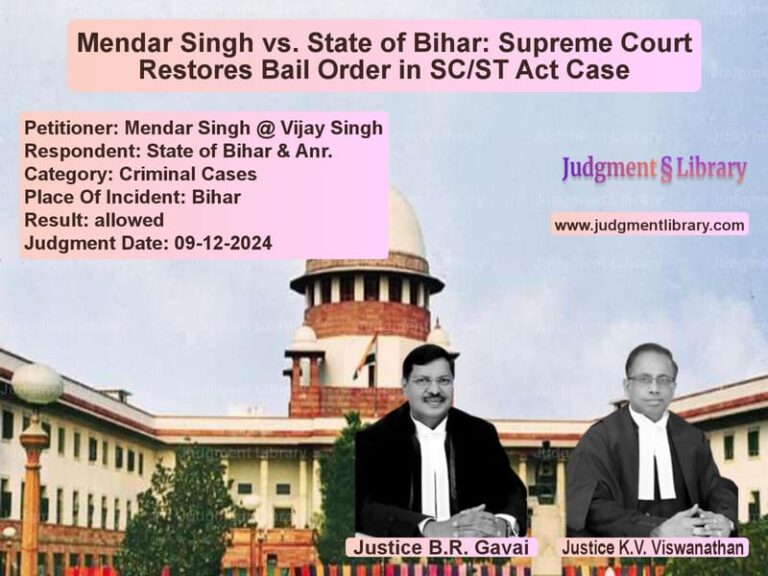Army Procurement Scam: Supreme Court Dismisses Appeal Against Tribunal Order
The case of Union of India & Ors. vs. P.S. Gill revolved around a high-profile military procurement scandal, where irregularities in the procurement of rations for the Indian Army led to an extensive legal battle. The Supreme Court was tasked with deciding whether the Armed Forces Tribunal (AFT) was correct in quashing the General Court Martial (GCM) proceedings initiated against P.S. Gill, a high-ranking Army officer.
The controversy stemmed from an alleged scam in the supply of food rations, which compromised the quality of supplies provided to troops. A Court of Inquiry was convened to investigate the matter, leading to disciplinary action against several Army personnel, including P.S. Gill, who was the Chief Director of Purchase in the Army Purchase Organisation at the Ministry of Defence.
Background of the Case
In 2005, the Chief of the Army Staff ordered an investigation into alleged procurement irregularities. A Court of Inquiry was established by the General Officer Commanding-in-Chief (GOC-in-C) Western Command, which identified twelve Army personnel, including P.S. Gill, as being prima facie responsible for the mismanagement.
Disciplinary action was initiated against Gill in 2006, but he challenged it before the Delhi High Court, which found that Rule 180 of the Army Rules, 1954 had been violated. The Court gave the government the option to either hold a fresh Court of Inquiry while ensuring compliance with Rule 180 or proceed directly with the disciplinary hearing under Rule 22.
The government chose the latter option. Despite an initial recommendation by his commanding officers stating that no charges could be made out against him, higher authorities disagreed and initiated court-martial proceedings against Gill. The case then reached the Armed Forces Tribunal (AFT), which ruled that there was no substantive case against him and quashed the General Court Martial (GCM).
Petitioner’s Arguments (Union of India)
The Union of India contended that:
- The AFT had no jurisdiction to intervene in court-martial proceedings at the interlocutory stage.
- The AFT overstepped its authority by evaluating the merits of the charges rather than allowing the GCM to determine guilt or innocence.
- The procurement violations committed by P.S. Gill were serious, impacting national security and logistics, warranting trial by GCM.
- The case was well within the jurisdiction of military courts, and the AFT’s decision undermined military discipline.
Respondent’s Arguments (P.S. Gill)
The defense of P.S. Gill was based on the following points:
- The charges against him were baseless and lacked any substantial evidence.
- The procurement decisions attributed to him were either within procedural norms or taken at higher levels of command.
- The AFT had the jurisdiction to intervene in cases where fundamental rights were violated or when there was a clear miscarriage of justice.
- His retirement from the Army should have prevented the continuation of disciplinary proceedings under Section 123 of the Army Act, 1950.
Supreme Court’s Judgment
The Supreme Court dismissed the Union of India’s appeal, affirming the AFT’s ruling. The key findings were:
- The AFT was well within its rights to intervene, as the charges lacked a legal basis.
- The Tribunal correctly found that there was no prima facie case against P.S. Gill, and a full court-martial trial would be unjust.
- The military prosecution failed to establish any financial wrongdoing or procedural breaches by Gill.
- Charges based on military procurement mismanagement must be backed by clear and credible evidence, which was lacking in this case.
- The Supreme Court reiterated that the AFT’s jurisdiction extends to ensuring fairness in disciplinary proceedings, even before a final verdict is reached by a military court.
The Court stated:
“The material on record was perused by the Tribunal to come to a conclusion that no prima facie case is made out against the Respondent. We do not see any reason to interfere with the said findings.”
Key Takeaways
- The Armed Forces Tribunal has jurisdiction to quash military court proceedings if they are found to be unjust or lack evidence.
- Military personnel accused of procurement irregularities must be tried based on concrete evidence rather than assumptions.
- Courts must ensure that disciplinary actions do not become tools for harassment or unfair punishment.
- The Supreme Court’s ruling reinforces the importance of procedural fairness in military justice.
This judgment serves as a crucial precedent in cases involving disciplinary actions against defense personnel and highlights the judiciary’s role in safeguarding due process.
Petitioner Name: Union of India & Ors..Respondent Name: P.S. Gill.Judgment By: Justice L. Nageswara Rao, Justice Hemant Gupta.Place Of Incident: New Delhi.Judgment Date: 27-11-2019.
Don’t miss out on the full details! Download the complete judgment in PDF format below and gain valuable insights instantly!
Download Judgment: Union of India & Ors vs P.S. Gill Supreme Court of India Judgment Dated 27-11-2019.pdf
Direct Downlaod Judgment: Direct downlaod this Judgment
See all petitions in Fraud and Forgery
See all petitions in Public Sector Employees
See all petitions in Judgment by L. Nageswara Rao
See all petitions in Judgment by Hemant Gupta
See all petitions in dismissed
See all petitions in supreme court of India judgments November 2019
See all petitions in 2019 judgments
See all posts in Criminal Cases Category
See all allowed petitions in Criminal Cases Category
See all Dismissed petitions in Criminal Cases Category
See all partially allowed petitions in Criminal Cases Category







